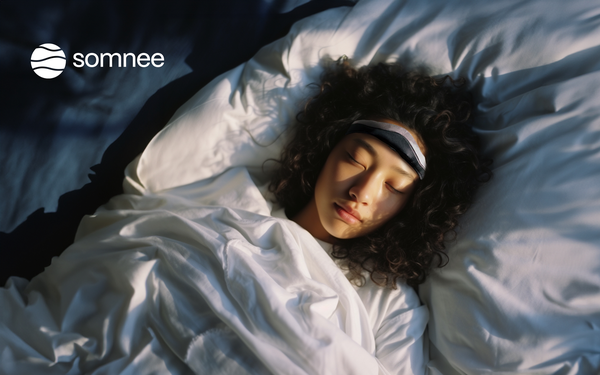
One in three Americans have trouble sleeping, per
the Centers for Disease Control and Prevention. No wonder sleep health is such a hot topic at this week’s CES show in Las Vegas.
CES exhibitors included Deep Sleep Technologies, whose
product to improve both sleep onset and sleep duration “almost immediately, without medication” is being targeted for integration into existing sleep technology and trackers; the Viv Ring,
billed as “the world's first smart ring equipped with generative sleep aid sound”; and an oral appliance from Dianyx Innovations that promises to treat sleep apneaat its network of
clinics.
The biggest innovation in sleep technology, however, may be taking place not in Las Vegas but Berkeley, California -- where Somnee CEO Tim Rosa, former CMO of wearable pioneer Fitbit,
is working on plans for the company’s second-generation product -- a follow-up to a two-year-old headband that “not only tracks how well you’re sleeping but actually fixes your
sleep.”
advertisement
advertisement
“Because of Fitbit and other wearables, a lot of people are very well versed in the idea of sleep tracking,” Rosa tells Pharma & Marketing Insider. But no
one else has combined that with a fix, he explains.
By wearing the AI-learning, neurostimulating headband for 15 minutes nightly, people fall asleep faster and then sleep longer,
according to the firm’s lab studies.
Rosa joined Somnee in late 2023 -- a couple of years after helping to lead Fitbit to its $2.1 billion acquisition by Google -- and is now in the
process of applying “a lot of the things that worked for us as we were building that brand to this company.”
“I’m using the playbook I used at Fitbit, where we
were a tiny company trying to create the category of wearables,” he says. “We had to do a ton of education about the technology…test and learn…and then figure out how do you
scale it.”
So Rosa reveals that he spent his first year at Somnee making the product more user-friendly. “My mom needs to understand what we’re talking about,” he says.
“If we’re going to build a mass consumer brand, we need to simplify complex things and create a best-in-class onboarding experience and consumer journey.”
That journey is
poised to get even better with Somnee’s second-generation product. While users are expected to remove the current headphone prior to sleeping, thus mainly focusing on falling asleep, Rosa
hints that the new version will be comfortable enough to wear all night, thus also zeroing in on staying asleep.
The new product, coming some time this year, will be accompanied by a
good deal of consumer advertising and marketing. Somnee has been researching and testing in this area, Rosa says, including messaging and audience segments over connected TV and digital.
At
Fitbit, he notes, “my marketing and advertising budget was over $100 million at one point. I feel this company will be bigger than Fitbit in terms of revenue and valuation. We won’t grow
as fast, but we own all the IP -- a most effective form of sleep improvement, and the technology to do that.”
Rosa has quietly hired veterans from both Fitbit and Google in marketing
areas, will be announcing “a major partnership with one of the biggest sports leagues,” and plans to talk with several ad agencies this quarter.
“We’ve been doing
this overtly, getting ready for scale,” he says.
The Somnee headband isn’t cheap. It has a minimum price of $299, which Rosa notes is less than a Fitbit or an Apple Watch. Users
also need a subscription to receive required replacement electrodes, costing up to $18 per month.
Consumer costs could drop if the device could be covered by insurance, such as CPAP machines
for sleep apnea. With that in mind, Somnee is working on an FDA-approved medical device version that doctors would prescribe for insomnia.
The company also plans to work with employers
(“at Fitbit, we worked with 70 of the Fortune 500”), insurance companies (such as Fitbit’s partnership with United Healthcare), sleep clinics and longevity clinics.
“My
agenda is to disrupt the pharmaceutical industry,” Rosa says. “Right now, if you go to your doctor and say you have a sleep issue, they are going to do [one of] two things: prescribe a
sleeping pill like Ambien or Trazodone. Some of them are addictive, they have side effects. The other is behavioral therapy, which takes a long time.”
Indeed, Somnee has been treating
Ambien, cognitive behavior therapies and also melatonin as its chief competitors, and Rosa says that will continue. The company cites its research showing it is 4x as effectiveness as a melatonin
pill, 2x more than cognitive behavior therapy. and 1.5x more than Ambien in improving sleep efficiency and duration.
Rosa himself had been using THC and CBD for his own insomnia before trying
Somnee prior to joining the company.
It’s worked for him, and he now hopes to bring the product to the “massive, massive audience of consumers, not just in the United States, but
at a global scale” who “struggle with sleep.”
Rosa says he enjoys having the opportunity to be “building a brand, and then growing and scaling your business and driving
the commercial success” -- but as a CEO this go-round.
“There haven’t been many CMOs that transition to CEO roles,” he relates. “I think you’re going to
start seeing a lot more of that because of what’s happening with cookies and performance. It’s a realignment back to brand and storytelling and community-building and things that are more
in the marketer’s wheelhouse of understanding.”